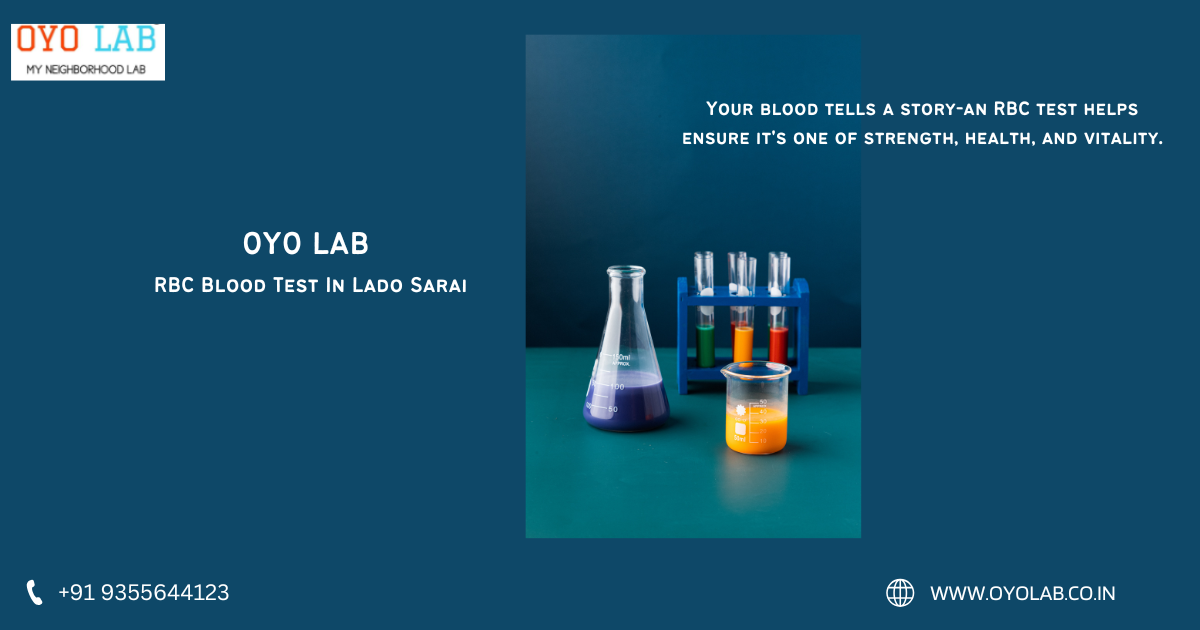
RBC Blood Test In Lado Sarai
By Shilpa | March 20, 2025
What Is RBC Blood Test ?
The RBC (Red Blood Cell) Blood Test measures the number of red blood cells in your blood. Red blood cells (erythrocytes) are responsible for carrying oxygen from the lungs to the rest of the body and removing carbon dioxide.
Why Is an RBC Test Done?
Doctors order an RBC test as part of a Complete Blood Count (CBC) to:
- Diagnose conditions like anemia, dehydration, or polycythemia
- Monitor chronic diseases like kidney disease or heart conditions
- Evaluate overall health during routine checkups
Normal RBC Count
(Ranges may vary slightly depending on the lab)
- Men: 4.7 to 6.1 million cells per microliter (million/µL) of blood
- Women: 4.2 to 5.4 million/µL
- Children: 4.1 to 5.5 million/µL
What Do Abnormal RBC Levels Mean?
- Low RBC count (Anemia) may indicate:
- Blood loss
- Nutritional deficiencies (Iron, B12, Folate)
- Bone marrow disorders
- Chronic diseases (Kidney disease, cancer)
- High RBC count (Polycythemia) may indicate:
- Dehydration
- Lung or heart disease
- Bone marrow disorders
- High altitude adaptation
How to Prepare for the Test?
- No special preparation is needed.
- Stay hydrated, as dehydration can affect results.
Importance Of RBC Blood Test
The RBC (Red Blood Cell) Blood Test is crucial for assessing overall health and diagnosing various medical conditions. It provides valuable insights into oxygen transport, hydration levels, and potential underlying diseases.
Key Reasons Why the RBC Test Is Important
-
Oxygen Transport & Energy Levels
- RBCs carry oxygen from the lungs to body tissues and remove carbon dioxide.
- A low RBC count can lead to fatigue, weakness, and shortness of breath.
-
Early Detection of Anemia
- Helps diagnose anemia, a condition caused by low RBC levels, which may result from iron, vitamin B12, or folate deficiency.
-
Monitors Chronic Diseases
- Useful in tracking conditions like kidney disease, heart disease, and cancer, as these can affect RBC production.
-
Detects Dehydration & Blood Loss
- A high RBC count can indicate dehydration, while a low count may signal internal bleeding or excessive blood loss.
-
Evaluates Bone Marrow Health
- Since RBCs are produced in the bone marrow, abnormal levels may point to bone marrow disorders or diseases like leukemia.
-
Assesses Effects of Medications & Treatments
- Used to monitor side effects of chemotherapy, radiation therapy, or certain medications that impact RBC production.
-
Helps in Altitude Adaptation
- People living at high altitudes naturally have higher RBC counts to compensate for lower oxygen levels.
Benefits Of RBC Blood Test
The RBC (Red Blood Cell) Blood Test is a simple yet essential diagnostic tool that helps assess overall health and detect various medical conditions. Here are the key benefits of this test:
1. Early Detection of Health Issues
- Helps identify anemia, a condition caused by low RBC levels that can lead to fatigue and weakness.
- Detects polycythemia (high RBC count), which may indicate lung disease, heart problems, or dehydration.
2. Monitors Chronic Diseases
- Assists in managing conditions like kidney disease, heart disease, and cancer, which affect RBC production.
- Helps track the effectiveness of treatments for bone marrow disorders and chronic illnesses.
3. Evaluates Oxygen-Carrying Capacity
- RBCs transport oxygen to body tissues; a test can determine if there’s enough oxygen circulating.
- Essential for diagnosing breathing problems, lung diseases, and heart conditions.
4. Helps Diagnose Nutritional Deficiencies
- Identifies deficiencies in iron, vitamin B12, or folate, which are necessary for RBC production.
- Aids in adjusting diet and supplements to improve overall health.
5. Monitors Blood Loss & Hydration Levels
- Low RBC count can indicate internal bleeding or excessive blood loss due to injury or medical conditions.
- High RBC count can point to dehydration, prompting timely medical intervention.
6. Assists in High-Altitude Adaptation
- Helps assess how well the body is adapting to high altitudes, where oxygen levels are lower.
- Useful for athletes or individuals relocating to high-altitude areas.
7. Tracks Effects of Medications & Treatments
- Ensures medications (like chemotherapy or radiation) are not negatively impacting RBC levels.
- Helps doctors adjust treatments based on blood test results.
8. Quick, Simple, and Non-Invasive
- A routine blood draw is all that’s needed for this test.
- Provides fast and reliable results for early intervention and better health management.